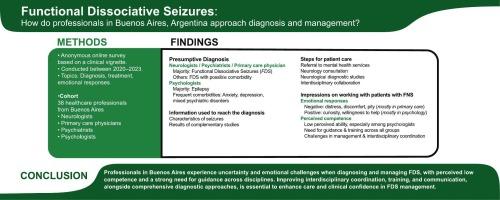功能性分离性癫痫:阿根廷布宜诺斯艾利斯的专业人士如何诊断和管理?横断面研究
IF 3.3
2区 医学
Q2 PSYCHIATRY
引用次数: 0
摘要
目的功能性分离性癫痫(FDS)是功能性神经系统疾病的一种亚型,是由神经系统功能紊乱引起的疾病。尽管确立了诊断标准,但医疗保健专业人员对其诊断和管理仍然存在很大的不确定性,特别是在低收入和中等收入国家。本研究考察了阿根廷布宜诺斯艾利斯的医疗保健专业人员在临床实践中如何感知和处理FDS。方法采用指数滚雪球抽样方法,在布宜诺斯艾利斯(2020 - 2023年)招募了神经学家、初级保健医生、精神科医生和心理学家。参与者完成了为这项研究开发和专家验证的在线仪器,包括两部分临床小短文。采用Braun和Clarke的六个步骤对定量数据进行描述性分析,对定性反应进行专题分析。结果共有38名医护人员参与。诊断模式因专业而异,神经学家和精神病学家倾向于FDS,而心理学家更常将癫痫诊断为精神合并症。诊断主要基于癫痫发作特征和精神健康症状。专业人员优先考虑患者背景和癫痫特征的进一步信息。治疗计划的重点是神经测试和转介到神经病学和精神卫生服务。挑战包括有限的培训和较低的认知能力,尤其是在心理学家中。在获得更多的病例细节后,一些参与者(主要是心理学家)将他们的诊断从癫痫改为FDS;所有专业团体都优先考虑进一步探索精神健康症状和障碍。本研究突出了阿根廷在FDS诊断和管理方面面临的挑战,包括培训有限和跨学科协调不力。改善教育和合作对于提高诊断、治疗和结果至关重要。本文章由计算机程序翻译,如有差异,请以英文原文为准。

Functional dissociative seizures: How do professionals in Buenos Aires, Argentina approach diagnosis and management?: A cross-sectional study
Objective
Functional Dissociative Seizures (FDS), a subtype of Functional Neurological Disorders, are conditions originating from disruptions in nervous system function. Despite established diagnostic criteria, significant uncertainty persists among healthcare professionals regarding their diagnosis and management, particularly in low- and middle-income countries. This study examines how healthcare professionals in Buenos Aires, Argentina, perceive and approach FDS in clinical practice.
Methods
This cross-sectional, mixed-methods study recruited neurologists, primary care physicians, psychiatrists, and psychologists in Buenos Aires (2020−2023) through exponential snowball sampling. Participants completed an online instrument developed and expert-validated for this study, including a two-part clinical vignette. Quantitative data were analyzed descriptively, and qualitative responses underwent thematic analysis using Braun and Clarke's six steps.
Results
A total of 38 healthcare professionals participated. Diagnostic patterns varied by profession, with neurologists and psychiatrists leaning toward FDS, while psychologists more often diagnosed epilepsy with psychiatric comorbidities. Diagnoses were mainly based on seizure characteristics and mental health symptoms. Professionals prioritized further information on patients' backgrounds and seizure features. Treatment plans focused on neurological testing and referrals to neurology and mental health services. Challenges included limited training and low perceived competence, especially among psychologists. After receiving more case details, several participants—primarily psychologists—revised their diagnosis from epilepsy to FDS; all professional groups prioritized further exploration of mental health symptoms and disorders.
Conclusions
This study highlights challenges in FDS diagnosis and management in Argentina, including limited training and poor interdisciplinary coordination. Improving education and collaboration are essential to enhance diagnosis, treatment, and outcomes.
求助全文
通过发布文献求助,成功后即可免费获取论文全文。
去求助
来源期刊
CiteScore
7.40
自引率
6.40%
发文量
314
审稿时长
6.2 weeks
期刊介绍:
The Journal of Psychosomatic Research is a multidisciplinary research journal covering all aspects of the relationships between psychology and medicine. The scope is broad and ranges from basic human biological and psychological research to evaluations of treatment and services. Papers will normally be concerned with illness or patients rather than studies of healthy populations. Studies concerning special populations, such as the elderly and children and adolescents, are welcome. In addition to peer-reviewed original papers, the journal publishes editorials, reviews, and other papers related to the journal''s aims.

 求助内容:
求助内容: 应助结果提醒方式:
应助结果提醒方式:


